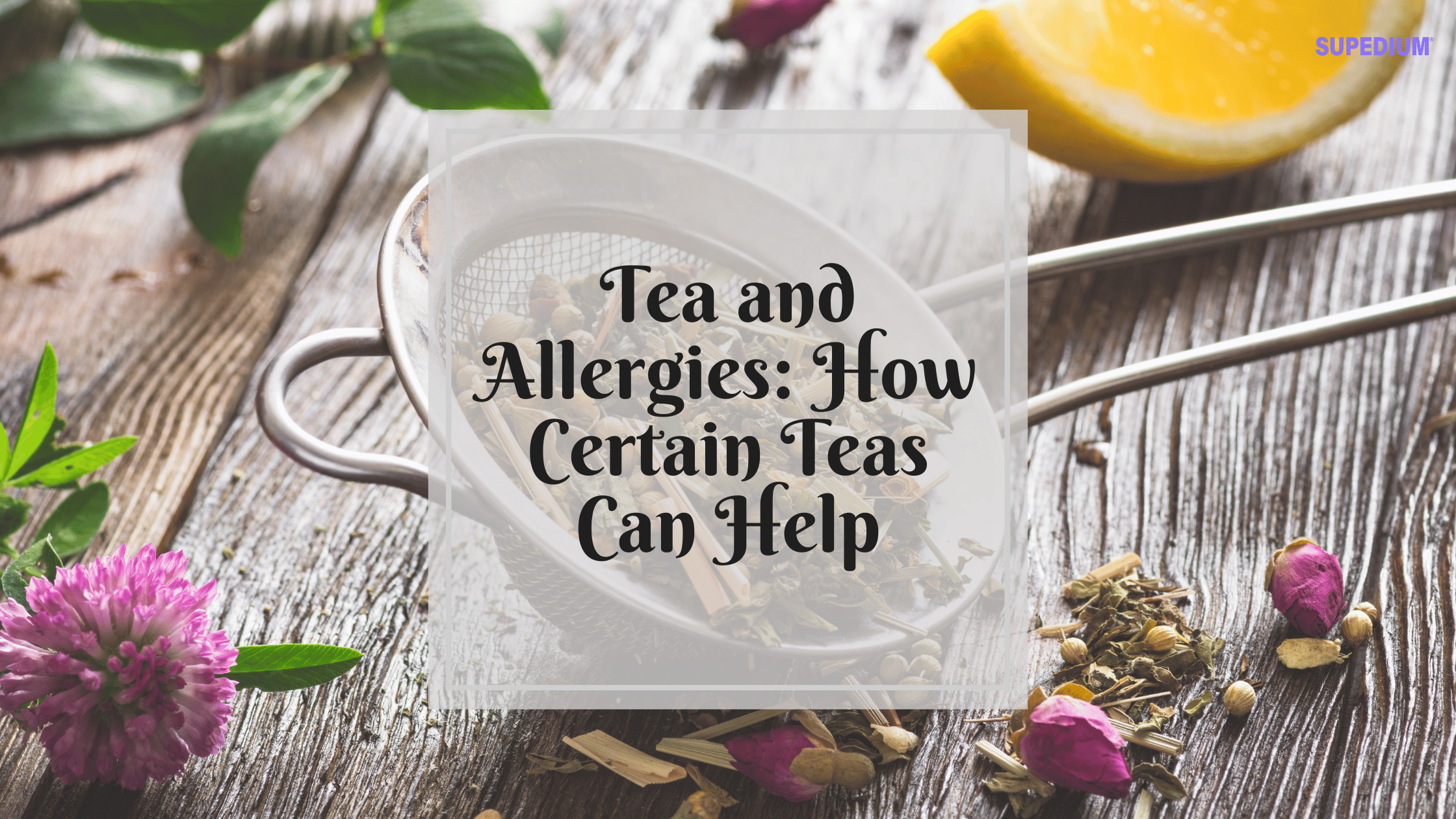Table of Contents
![]()
Allergies affect millions of people worldwide, causing symptoms like sneezing, congestion, itchy eyes, and even skin irritation. While over-the-counter medications can help manage these symptoms, many individuals turn to natural remedies, such as tea, for relief. Certain teas contain compounds that can alleviate allergy symptoms and improve overall immune function. In this article, we will explore how specific teas can help ease allergy symptoms, their benefits, and how to incorporate them into your routine.
Understanding Allergies and Their Mechanisms
How Allergies Work in the Body
Allergies occur when the body’s immune system mistakenly identifies harmless substances, such as pollen, pet dander, or dust mites, as harmful invaders. In response, the immune system produces antibodies that trigger the release of histamine, a chemical that causes inflammation and other allergic reactions. Histamine contributes to the common symptoms of allergies, including sneezing, runny nose, and itchy or watery eyes.
Why Natural Remedies Like Tea Can Be Effective
Herbal teas can help manage these symptoms because many of them contain anti-inflammatory, antihistamine, or immune-boosting properties. The compounds found in certain teas may reduce the release of histamine, soothe irritated airways, and support the immune system, making them a natural and effective option for allergy relief.
The Best Teas for Relieving Allergy Symptoms
1. Peppermint Tea
Benefits: Peppermint tea is known for its natural antihistamine properties, making it particularly useful for relieving allergy symptoms such as congestion and a sore throat. The menthol in peppermint helps to clear nasal passages and provides a soothing sensation in the throat, which can help ease irritation caused by allergic reactions.
How it helps: Peppermint tea can reduce nasal congestion, promote clearer breathing, and soothe the throat, making it ideal for those who suffer from post-nasal drip or irritated airways due to allergies.
Best for: Congestion relief and sore throat caused by seasonal allergies or colds.
2. Ginger Tea
Benefits: Ginger has long been recognized for its anti-inflammatory and immune-boosting properties. It can help reduce inflammation in the sinuses, clear up congestion, and support the body’s defense mechanisms against allergens.
How it helps: Ginger’s natural anti-inflammatory properties make it effective in reducing sinus pressure and inflammation, two common issues associated with allergies. Additionally, it can help relieve nausea and digestive discomfort that may accompany allergies.
Best for: Seasonal allergies, especially when combined with honey or lemon to soothe the throat.
3. Chamomile Tea
Benefits: Chamomile is another popular tea for allergy relief due to its natural antihistamine and anti-inflammatory properties. It has a calming effect on the body and can help reduce the discomfort caused by allergic reactions, including skin irritation and nasal congestion.
How it helps: Chamomile helps to reduce allergic reactions, particularly those related to hay fever and environmental allergies. It is also useful in calming the body, promoting relaxation, and aiding sleep, which can be disrupted by allergy symptoms.
Best for: General allergy relief, especially during evening hours to help with sleep disruption caused by allergies.
4. Nettle Tea
Benefits: Nettle is a powerful natural antihistamine, often used to treat hay fever and seasonal allergies. It has been shown to reduce the symptoms of allergic rhinitis, including sneezing, itchy eyes, and nasal congestion.
How it helps: Nettle works by blocking the production of histamine, a chemical responsible for allergic reactions. This makes it particularly effective for treating pollen-related allergies, such as hay fever.
Best for: Seasonal allergies, especially those caused by pollen or plant-based allergens.
5. Eucalyptus Tea
Benefits: Eucalyptus has natural decongestant properties, making it effective in treating sinus congestion, a common issue during allergy flare-ups. It also has antibacterial and anti-inflammatory effects, which can help reduce irritation in the respiratory system.
How it helps: Eucalyptus tea helps open the airways, making it easier to breathe when dealing with nasal congestion. It also helps relieve sinus pressure and can reduce inflammation in the upper respiratory tract, offering significant relief from allergy-related congestion.
Best for: Treating cold-like allergy symptoms, especially sinus congestion.
6. Licorice Root Tea
Benefits: Licorice root has long been used in traditional medicine for its anti-inflammatory and immune-boosting effects. It can help reduce allergic reactions and inflammation, especially in the respiratory system.
How it helps: Licorice root helps to soothe irritated airways, reduce inflammation in the sinuses, and promote overall immune health. However, it should be consumed in moderation, as excessive use can lead to increased blood pressure in some individuals.
Best for: Allergy relief and immune system support, particularly for individuals experiencing chronic allergy symptoms.
Tea Blends for Allergy Relief
Combining different types of tea can enhance their effects, offering a more comprehensive approach to allergy relief. Here are some beneficial tea blends:
1. Peppermint and Ginger Tea
This combination is excellent for relieving nasal congestion, soothing the throat, and reducing inflammation. Peppermint helps clear the sinuses, while ginger provides an anti-inflammatory boost, helping reduce overall allergy symptoms.
2. Chamomile and Nettle Tea
This blend works well for relieving sneezing, itchy eyes, and nasal congestion. Chamomile’s antihistamine properties, combined with nettle’s ability to block histamine production, make it a powerful option for combating seasonal allergies.
3. Eucalyptus and Licorice Root Tea
For those struggling with sinus pressure and congestion, this blend offers excellent relief. Eucalyptus opens the airways, while licorice root helps soothe the respiratory system and reduce inflammation.
How to Use Tea Effectively for Allergy Relief
When to Drink Tea
To maximize the benefits of tea for allergies, it is best to start drinking tea before allergy season begins. However, drinking tea during peak allergy symptoms can also provide immediate relief. Aim to drink 1-3 cups daily, depending on your symptoms, and be consistent for the best results.
Complementing Tea with Other Remedies
Tea can be even more effective when combined with other natural allergy relief methods. For example, honey has been shown to help alleviate allergy symptoms, and nasal irrigation (using a saline rinse) can help clear allergens from the nasal passages. Additionally, maintaining hydration and using air purifiers can support your overall allergy management plan.
Precautions
Although herbal teas can be beneficial for allergy relief, it’s essential to ensure that you are not allergic to any of the ingredients. For example, chamomile may trigger allergic reactions in individuals who are sensitive to ragweed. Also, some herbs, like licorice root, should be consumed in moderation, particularly for people with high blood pressure or other health conditions.
Additional Tips for Managing Allergies Naturally
Creating an Allergy-Relief Tea Routine
Incorporating tea into your daily routine can help build long-term immunity to allergens. Drinking a cup of tea in the morning and evening, particularly during allergy season, can be an effective way to reduce the frequency and severity of allergy symptoms.
Avoiding Allergy Triggers
In addition to using tea for relief, try to minimize exposure to allergens by keeping windows closed during high pollen seasons, washing bedding regularly, and using air filters in your home.
Supporting Overall Immune Health
A strong immune system is key to preventing and managing allergies. Along with drinking tea, ensure you maintain a healthy diet, exercise regularly, and manage stress to support your body’s natural defenses against allergens.
Conclusion
Tea can be a powerful ally in managing allergies and reducing symptoms naturally. Whether you prefer the decongestant effects of eucalyptus tea or the antihistamine properties of nettle and chamomile, there are plenty of options to explore. By incorporating these teas into your routine and combining them with other natural remedies, you can find significant relief from the discomfort of allergies and improve your overall well-being. Always remember to consult with a healthcare provider if you have concerns or if your symptoms persist.
Share This





Be the first to comment